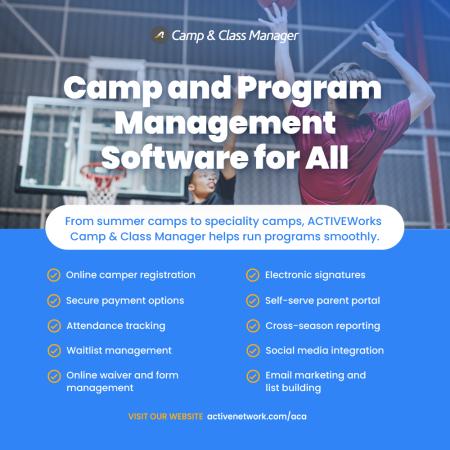Parents are our partners. Not only do they control the supply chain of campers, and to some extent our young-adult seasonal staff, they also are the ones who pay and ensure their children arrive with clothing, a flashlight, sleeping bag, and toothpaste. We need parents to trust and work alongside us to give their children the best shot at a successful camp experience. In theory this sounds ideal and reasonable, but over the past two decades we have seen a significant shift in parenting behavior and expectations.
Twenty-five years ago, the parental unit purchased the camp experience somewhat blindly. They trusted the directors to know what they were doing, and they understood that the food probably wouldn’t end up in a Michelin guidebook and that their child likely would come home with some new vocabulary skills. Did they worry about return on investment for their camp tuition? Well, kind of — but they tended to measure that return in friendships formed and cool stories of daring deeds. That was the package. Parents asked few questions. They made rare phone calls to camp, usually spurred by angst related to a camper letter sent days or weeks earlier — by which time the issue in question had been resolved.
Today presents a dramatically different picture. With no criticism intended, reflecting on it through a 2023 lens, the notion that we sent children to camp under the supervision of people we didn’t know, in many cases to a place we’d never visited, was kind of strange. Today our parents are quite rightly asking more questions and expecting thoughtful, robust answers. For example, have you heard any of the following?
- Who is the director and senior staff and what are their qualifications?
- What skill acquisition should we expect when our child participates in (insert activity area)?
- How do you train the staff and what about background checks?
- What are your security procedures?
- Do you serve (insert dietary type) food?
- What is your cell phone policy, as I must talk to my child regularly?
- How often and at what time will I see a picture of my child posted online?
- Do you have bullying and how do you deal with it?
The list of questions is endless, and they are all fair game. The reality is that today’s camp director must be prepared to answer these questions with confidence and honesty, understanding where parents are coming from in today’s overly stimulated world: a place of caring and concern, love, and attention to detail. Which brings us to why? What changed in our parenting modality to create a deeper need to control and understand their children’s various environments?
Myriad events have happened that explain this shift, but one prominent cause is technology and the overwhelming access to information. Consider this: as a child born before 2000, if something significant happened somewhere at home or around the globe, it eventually filtered through and was at some point reported on television or in a newspaper. Now that the age of innocence has been erased, up-to-the-minute news and videos bombard us — in essence, real-time pain, fear, and sometimes hate. We can instantly look up where sexual predators live or a host of other information that was never readily available before. Is it any wonder parents are more concerned, skeptical, and driven to ensure their children are constantly monitored and safe?
It isn’t just parents who are exposed to potentially traumatizing events. Eighty percent of parents in the United States say their children aged 5 to 11 use or interact with tablet computers, while 63 percent say the same about smartphones (Auxier et al., 2020). That’s easy access and broad exposure to potentially anxiety-inducing real-time news.
With news and information instantly streamed and few filters in place, we are seeing seismic shifts in attitude, behaviors, and expectation — and parents are reacting in ways they believe are in their children’s best interest.
So how do we, as youth-development professionals, handle this shift in parenting style from the “fly-over” (1900 to 1999) to “helicopter” (2000 to 2007) to “drone” (2008 to today) and whatever may follow?
The answer is “Very carefully.” We are in the youth-development business and have an obligation to the truth, to kindness, to transparency, and to the education of our children and young-adult staff. And more than ever before, we are obligated, where possible, to help educate parents too.
We typically find ourselves interacting with three types of parents before, during, and after camp:
- Type 1: laissez-faire, engaged, and willing to give the benefit of the doubt, but still in need of answers. This group accounts for approximately 50 percent of parents.
- Type 2: well-meaning, somewhat enmeshed, protective, and willing to spend money on a product they believe brings value. This group likely accounts for approximately 40 percent of parents.
- Type 3: overzealous, critical, suspicious, untrusting, and more than happy to share their concerns in a blaming manner with the expectation of an immediate fix. This group probably accounts for between 5 percent and 10 percent of parents.
All three parent types are a product of their own upbringing, environment, emotional leanings, and politics. These are simply categories — not judgments — to more easily understand and level-set our expectations.
Type 1 and 2 parents are capable of being educated and receptive to guidance, if presented appropriately, along with cogent reasoning that supports your counsel. Type 3 parents are unlikely to grasp your intent, and while clearly in the minority, they can overwhelm and require significant amounts of time and human resources to resolve their issues. Moreover, this is the group that uses word of mouth and social media to share their angst — in some cases threatening to weaponize incidents online.
Type 3 parents aren’t bad people; they have just learned an approach that they believe works for them. However, we are teachers and youth professionals, and we are here to educate, be transparent, and take the entire community into account when we make decisions. Type 3 parents are not immune to education if approached with care.
Here are some practical tips that can help you navigate and address the three types of parents:
- Accept that the world has changed, and everyone has the right to parent as they see fit. Once we come to terms with this new normal, we can better approach how we work with parents who behave within a pendulum of normal and acceptable versus errant and inappropriate.
- Teach early and often. Engage with parents during the sales process and build a relationship. Then you will have the opportunity to share clear expectations related to parental engagement and behavior. Ideally, inform parents of a mandatory orientation that takes place in advance of the summer — these are not for children but for the grown-ups. These orientations can be in person or via webinar. They should include a segment labeled “parent engagement, expectation, and interactions.” This allows for a transparent conversation that speaks to your organizational culture.
- For example, you may expect every parental interaction to be polite, and may even have a policy mandating that parental interactions be polite and that shouting, demanding, or threatening will result in a request that the parent cool down and call back when they are able to control their emotions. Now how you present this policy is an art and, ideally, you do it with energy, humility, and humor. But the message should clearly communicate expectations for how parents will respond if an issue arises with their child during camp.
- Anecdotally, as the CEO of a summer camp, this author’s rule was clear: if a parent shouted at any camp staff, that staff member would respectfully decline further interaction and instruct the parent to speak directly to me. It worked. And, for the most part, those behaviors became rare — and staff felt protected and respected.
- For example, you may expect every parental interaction to be polite, and may even have a policy mandating that parental interactions be polite and that shouting, demanding, or threatening will result in a request that the parent cool down and call back when they are able to control their emotions. Now how you present this policy is an art and, ideally, you do it with energy, humility, and humor. But the message should clearly communicate expectations for how parents will respond if an issue arises with their child during camp.
- Share good news with parents on a regular basis to build rapport and encourage trust. This is not achieved via a broadcast email but through personal calls. For example, “Hey, I saw Jane, and she was helping another child in their cabin who was really homesick. I just wanted you to know how terrific she is.” Not only does this remind parents during the long, tiring summer that wonderful things happen at camp, but it is also a heck of a sales technique that can be leveraged in the off-season. Such efforts will also spread around the parent community as evidence that camp’s culture of kindness is real. Then, when you have an issue to deal with, you can remind the parent that you share good and challenging information every day.
Parent Communication Golden Rules
Your communication with parents will be most effective if you follow these rules when sharing news from camp:
The first words when making an outbound call after introducing yourself should always be “[Insert child’s name] is safe.” Alleviate that common parental anxiety, and then you can tell them the good or bad reason for your call.
You can share good news electronically via email, phone, or text, but you must deliver bad news by phone, video conference, or in person. Be simple, clear, and kind.
When Communication Difficulties Persist
Might there come a time when it is not possible to educate a parent? Absolutely. Those type 3 parents can be demanding and frustrating. Moreover, they can damage your staff team and compromise your culture. So, what should you do when caught in a cycle of inappropriate behavior?
Try not to punish a child for their parent’s behavior. As camp professionals, we can go to extraordinary lengths to ensure a child is successful despite a parent behaving badly. But the bottom line is that you have a broader responsibility to the camp community — to staff, campers, and other parents — to operate safely and within the framework of the culture you “sold” your camp on when they registered. In the event parents choose to ignore norms and expectations that have been clearly articulated in advance, here is some advice for how to deal with them:
Be clear and concise in your expectations of behavior and decorum. Set the ground rules early regarding tone, temperature, and threats.
Acknowledge an error as soon as possible if you made one, and do your best to make it right (even if that includes refunds or credits). Don’t take responsibility for anything that you didn’t do regardless of how many times the person repeats an accusation.
Articulate your desire to find common ground and a workable solution. Then go after it and do your best.
If after you have exhausted every avenue the parent is still not content and apportions blame, politely invite them to leave and take their child with them. Yes, it sounds harsh, and, yes, this action does punish the child for parental behavior. But you have a community to monitor, support, and teach. Being sucked into a never-ending negative relationship to which you cannot find resolution is in no one’s best interests. Will they tell people how awful your camp is? Perhaps. Will it impact your future registration? Probably not, because the other 99 percent of parents love what you do.
Inform your board of directors/owners immediately that a situation occurred and was resolved, and give them a general outline of events. Educate your board about these types of issues during the year, and work hard to create a strong board that understands and supports your actions.
In the unlikely events that a disgruntled parent threatens legal action, inform them immediately that based on a threat you can no longer discuss or negotiate a fair settlement directly. Give them one chance to recant, and, if they do not, cease the conversation and contact your legal advisor immediately. You also will likely need to notify your insurer right away. Again, this is rare, but you should be prepared to greet litigious threats with a calm and clear response.
These tips are subject to unique circumstances and different clientele. If only everything in the camp space was predictable — but it is not. What matters is that now more than ever before parents need help and support being parents, and we, as youth development professionals, sit in a unique space and place to work alongside them to counter the emotional and physical external forces that make life so challenging, extraordinary, and worthwhile.
We occasionally see people at their worst, but most parents are simply trying their best. And our job is to help them any way we can. This means purposeful education, thoughtful and managed expectations, and consistent cultural norms that we stick with, regardless of what type of person a parent chooses to be.
Photo courtesy of Sunbury Urban Farm Summer Camp, Columbus, OH
References
Auxier, B., Anderson, M., Perrin, A., & Turner, E. (2020, July 28). Parenting kids in the age of screens. Pew Research Center. pewresearch.org/internet/2020/07/28/parenting-children-in-the-age-of-screens
David Phillips is principal of Immersive1st, a firm specializing in fundraising, planning, visioning, governance, acute organizational analysis, and program creation, implementation, and evaluation. His passion is doing important things with good people who make a difference (and having fun while doing it). He holds an MSW in Social Work with a focus on community organizing and development from the University of Pittsburgh. David can be reached at [email protected] or via the web at immersive1st.com.



